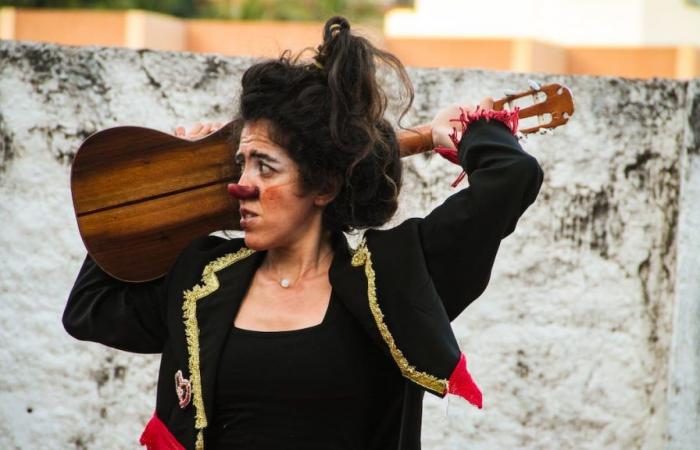Julieta Hernández Martínez, a woman who firmly believed that art can transform the world and that is why she traveled with her little one Show the deepest Brazil by bicycle, has been lying for six months in a grave in Puerto Ordaz (Venezuela), the city where he grew up. When she wore her nose red, she was the traveling clown Miss Jujuba. The artist, 38 years old, was cruelly murdered on the night of December 22 while she was pedaling across the Brazilian Amazon towards Venezuela. A couple of hers became angry with her and killed her in the spartan inn in a city called Presidente Figueiredo where she stopped. Her body, her bicycle, her mobile phone and other belongings were located because, as soon as she stopped responding to her messages, her family and her circus colleagues mobilized. They sent a delegation there to pressure the local authorities and managed to get them to look for her.
That alliance has now undertaken another battle, led by his sister, Sophia Hernández, 37 years old, so that this murder is judged as a femicide, not as a robbery followed by death, as the prosecution claims. A veteran lawyer in human rights litigation, Brazilian Carlos Nicodemos, has taken on the case and formally requested that change. Being able to appear as an accusation has been an arduous task.
Her murder put the spotlight on the dangers that lurk for women who travel alone and on the precariousness that accompanies traveling artists.
“What happened to my sister was not a robbery. They didn’t kill her over a cell phone. [Los asesinos] They hid their objects to hide the crime. They never unlocked the phone,” explains Hernández, director of photography and art, from Caracas in an interview by video call. “It was an act of torture, xenophobic. They rape her, kill her and hide her,” she adds. The Brazilian Ministry of Women agrees with this thesis and points to feminicide in an official note: “The violence against Julieta Hernández presents characteristics of a misogynistic and xenophobic crime, of hatred towards the circus artist as a woman and as a migrant.”
The prosecutor in the case disagrees. The victim’s sister met her in person on the 12th, when she managed to get to Presidente Figueiredo to meet with local authorities and visit the crime scene. She says that the representative of the Public Ministry blurted out to her and her lawyer: “I don’t understand this whim of considering what happened a feminicide.” Prosecutor Fabia Melo Barbosa de Oliveira went further, according to Hernández’s story. “She told us that the city is very safe and that Julieta got involved with someone she shouldn’t have, re-victimizing her again,” she details, indignant and hurt.
Miss Jujuba had been traveling the roads for years. She already pedaled to Patagonia, round trip. In her life she added about 45,000 kilometers, according to her family. On the road, she acted, gave puppet workshops, wrote, drew, and exchanged knowledge and experiences with local artisans while continuing to participate in the dense network of collaboration woven by the itinerant street artists.
That justice is done is a collective task. Hernández and his mother, Julia, a 75-year-old retired civil engineer, visited Brazil in March seeking political support so that the case is not falsely closed. This month, the sister returned. She traveled to the Amazon supported by the lawyer Nicodemos, by two high officials of the Ministry of Women of the Lula Government, she has the support of the União Brasileira de Mulheres, a feminist organization, and the Urgent Action Fund, another Latin American feminist entity, which financed the trip. Between one visit and another, they have met with dozens of politicians, activists, official organizations…
Presidente Figueiredo, 150 kilometers north of Manaus, is a city of 37,000 inhabitants named in honor of a general-president of the dictatorship with a natural park that attracts tourists to its waterfalls. The clown’s family suspects that “the local authorities want to close the case as soon as possible, as if nothing had happened there.” The murderers, Thiago da Silva, 32, and Deliomara Santos, 29, also accused of rape and concealment of the body, have been imprisoned since the arrest.
The night of the murder was the second that the nomadic artist spent the night at the precarious inn, where she was the only guest. The fact that the couple who ran the place had four small children gave him enough confidence to stay, hang the hammock and sleep for two dollars. Her initial plan was to stop for just one night, her sister says. Thanks to the cell phone and the photos that Miss Jujuba was depositing in the cloud, she has been able to reconstruct the fatal evening. She buys milk and food for the children and decides to stay one more night. She takes photos caressing the children at the crime scene. Before going to the plaza to perform, she makes a selfie in front of the hammock…”. Then he goes to put on her show, returns to the accommodation and “talks with my mother until 12:47 a.m. There she loses track.”
From the beginning, the Presidente Figueiredo police pointed to the telephone as the trigger for the brutal attack. Miss Jujuba had just bought it with contributions from her followers because in the 21st century it is essential in the traveling artist’s kit, it expands the audience and allows receiving instant payments from those who do not carry cash. The device was found near the body. In fact, the murderers do not even bury the body, they wrap it in a rug, cover it with some branches and, the sister concludes, “they do not try to sell anything, they continue with their lives.”
The family also managed to recover and now treasures the cuatro (a typical Venezuelan guitar) that had been made following the instructions of a luthier, the bicycle, which a neighbor stole and returned given the impact and the red nose. “The first thing that appeared,” the little Hernández girl recalls excitedly. They also located a statue of Saint Francis of Assisi, patron saint of animals, which accompanied the artist trained as a veterinarian, who changed the consultation for a red nose and a bike. Her clown shoes and her performance clothes never appeared.
When they arrived at the scene of the attack, they were stunned. “The most atrocious thing is that it is surrounded by many houses, houses that have no windows. The kitchen in which they kill her is open… The first people they should question are the neighbors,” he says. The brutality of her crime—they raped and burned her before killing her—leads one to think that her screams reached far from her. Hernández considers it intolerable that the police have only questioned the confessed murderers and the guy on the bike.
Sophia Hernández or Sophia, la Roja, her professional name, lived in Marseille until the murder forever shook her life and that of her mother. In these seven months she has not returned to her home in France. Fighting for her sister is now her vital mission. “When I saw that, if I did nothing, the murderers would go free, I decided to fight for justice for Julieta and for all women.”
The world of the circus, small and combative, is very organized. The exchange of information and advice about routes, shelters and the most grateful public is constant. That network was crucial in January to raise the alarm on social networks, mobilize public opinion and get President Figueiredo’s police to react.
Hernández is convinced that, if it weren’t for that, there would be little motivation to search for the umpteenth missing person. “They never looked for Julieta, she was a foreigner, they didn’t want this to come to light, they wanted to close it quickly.” She will also knock again on the door of the Government of Venezuela, which promised to help them with the case.
Miss Jujuba was buried next to her father, Victor, a cartoonist and poet who bequeathed a love of art to his two daughters. Her passion for traveling and being independent was inherited from her mother.
Follow all the information from El PAÍS América in Facebook and xor in our weekly newsletter.






